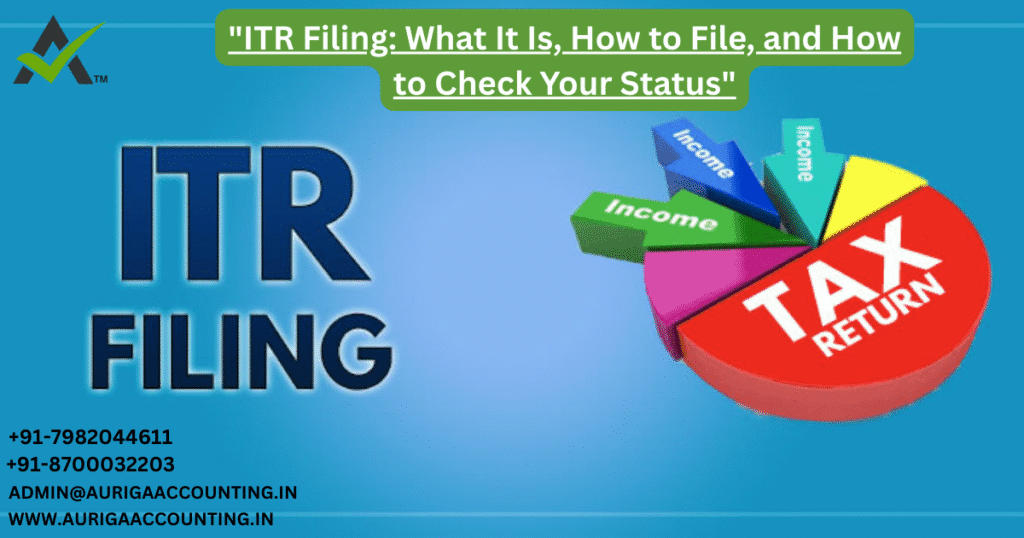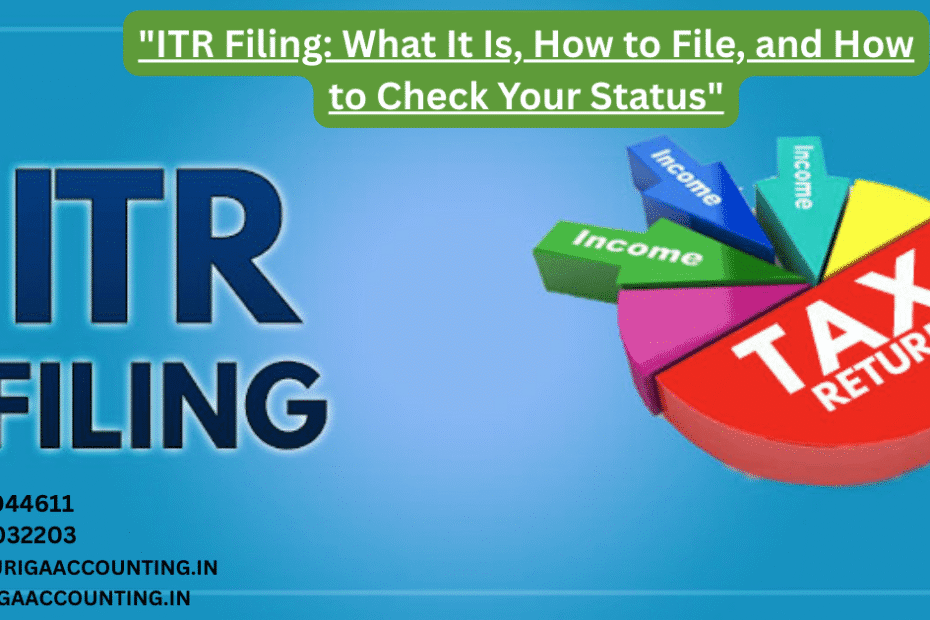
"ITR Filing: What It Is, How to File, and How to Check Your Status"
Introduction
Toggle“Income Tax Return (ITR) is a vital document that Indian taxpayers must file annually with the Income Tax Department. It outlines an individual’s or entity’s income, deductions, and tax liabilities. Accurate ITR filing is mandatory for individuals, businesses, and organizations, serving as a key element in maintaining tax compliance. By offering a complete picture of one’s financial status, it promotes transparency and accountability. With the continual evolution of India’s tax regulations, understanding and timely submission of ITRs are essential for sound financial management and regulatory adherence.”
What is ITR Filing in India?
Simply put, an Income Tax Return (ITR) is a form where taxpayers report their income, expenses, deductions, and tax liabilities to the Government of India. Tax is a portion of your earnings paid to the government as per the law of the land. However, you are required to pay income tax only if your income exceeds certain thresholds specified by the authorities.
The Income Tax Act, drafted by the Government of India, governs the country’s tax system. Under this law, tax is levied on the taxable income of individuals, Hindu Undivided Families (HUFs), businesses (including LLPs), professionals, municipal bodies, and others specified under the regulations. A person’s residential status and income level determine their tax obligations. Indian residents must pay tax on their global income. Each eligible taxpayer must follow specific guidelines to prepare and file their ITRs annually.
The Income Tax Department uses ITR forms to collect financial data from taxpayers for the financial year (April 1 to March 31 of the following year). Income can arise from various sources, including salary, business profits, sale of assets, dividends, capital gains, and interest. If excess tax is paid, the Income Tax Department processes a refund
Types of ITR Forms
The Income Tax Department offers seven types of ITR forms, catering to different categories of taxpayers and income sources:
ITR-1 (Sahaj): For resident individuals earning up to ₹50 lakh from salary, one house property, or other sources. Not applicable for NRIs.
ITR-2: For individuals and HUFs with income from salary, multiple properties, capital gains, or other sources, but not from business or profession. Suitable for NRIs as well.
ITR-3: For individuals earning income from business or profession, including those engaged in intraday trading, futures, and options.
ITR-4 (Sugam): For individuals, HUFs, and firms (other than LLPs) opting for presumptive taxation with business turnover up to ₹2 crore or professional income up to ₹50 lakh.
ITR-5: For partnership firms, LLPs, Association of Persons (AOPs), and Body of Individuals (BOIs).
ITR-6: For companies not claiming exemptions under Section 11 (income from property held for charitable or religious purposes).
ITR-7: For entities like trusts, political parties, and institutions that claim exemption under Sections 139(4A), 139(4B), 139(4C), and 139(4D)
Essential Forms for ITR E-Filing
Form 16: Issued by employers, it summarizes your salary and tax deductions, showing gross income, exemptions, net taxable income, deductions, and TDS.
Form 26AS: A consolidated tax statement showing all TDS deducted, advance tax, self-assessment tax payments, and high-value transactions.
Form 15G and Form 15H: These forms are declarations for individuals (Form 15G) and senior citizens (Form 15H) to prevent TDS if their income is below the taxable limit.
Is ITR Filing Mandatory?
Yes, filing an ITR is mandatory if your income exceeds the basic exemption limit set by the Government of India. Failing to file can lead to penalties and can negatively impact your ability to obtain loans or visas. The tax rates are predetermined by law, and taxpayers are obligated to comply.
Timely ITR filing ensures financial transparency, strengthens your financial credibility, and keeps you aligned with evolving tax regulations. Don’t let confusion hold you back — understanding “What is ITR” empowers you to manage your finances confidently and accurately.
When Should a Taxpayer File an ITR?
ITR filing becomes mandatory under the following circumstances:
Income Thresholds:
Individuals earning more than ₹2.5 lakh in a financial year, regardless of age, must file ITR.
For senior citizens (aged 60 to 79), the exemption limit is ₹3 lakh.
For super senior citizens (aged 80 and above), the limit rises to ₹5 lakh.
While calculating taxable income, deductions under Sections 80C to 80U, Section 80TTA, Section 80TTB, and exemptions under Section 10 should be deducted from gross income.
Companies:
All companies must file ITR, irrespective of profit or loss during the financial year.
Tax Refunds:
Individuals seeking a refund of excess taxes paid must file an ITR to claim their refund.
Foreign Assets:
High-net-worth individuals holding assets or financial interests outside India are required to file ITR.
Foreign Entities:
Foreign companies making transactions in India and availing benefits under tax treaties must file ITR.
Non-Resident Indians (NRIs):
NRIs with an annual income exceeding ₹2.5 lakh in India must also file an ITR.
How to File ITR Online
Filing your Income Tax Return online is simple and convenient. Follow these steps:
Register/Login:
Visit the Income Tax e-filing portal and register using your PAN card details, or log in if you already have an account.Download the Relevant Form:
Choose and download the appropriate ITR form based on your income type and taxpayer category.Fill the Form:
Accurately fill in your income details, claim deductions, and upload any necessary supporting documents.Compute and Pay Taxes:
Calculate your final tax liability and pay any due taxes online, if applicable.Verify Your ITR:
Complete the verification process via Aadhaar OTP, net banking, electronic verification code (EVC), or by physically mailing a signed ITR-V to the Centralized Processing Center (CPC).Receive Acknowledgment:
Upon successful verification, you will receive an acknowledgment receipt (ITR-V) at your registered email address.
Which ITR Form Should You File?
Choosing the correct Income Tax Return (ITR) form is essential for accurate and timely tax filing. The form you need depends on your income sources and taxpayer category. Simplify your understanding of income tax returns with our guide, ‘What is ITR,’ and strengthen your financial knowledge for a compliant and secure future.
Examples:
ITR-1: For resident individuals with income up to ₹50 lakh from salary, one house property, or other sources.
ITR-2: For individuals and Hindu Undivided Families (HUFs) earning income from capital gains, multiple properties, or foreign assets.
It’s recommended to consult a tax professional or use a trusted online ITR filing service to choose the correct form for your specific situation.
Documents Required for ITR Filing
Before filling out your ITR, gather these essential documents:
PAN Card
Aadhaar Card
Form 16 or Salary Certificate
TDS Certificates
Bank Statements
Details of Investments and Property Ownership
Having all necessary documents ready ensures a smooth and error-free filing process.
Who Must Submit an Income Tax Return?
By law, the following individuals and entities must file an Income Tax Return annually:
Individuals:
Under 60 years: Annual income above ₹2.5 lakh.
Senior Citizens (60–79 years): Annual income above ₹3 lakh.
Super Senior Citizens (80 years and above): Annual income above ₹5 lakh.
Note: Deductions under Section 10 and Sections 80C–80U must be considered before arriving at the taxable income.
Businesses:
Even if a business reports a loss for the year, it must still file an ITR.Individuals Seeking a Tax Refund:
Those who have paid more tax than required must file an ITR to claim a refund.Persons with Foreign Assets:
Individuals holding financial interests or assets outside India must file an ITR.Entities Claiming Treaty Benefits:
Indian corporations or foreign companies benefiting from tax treaties must file returns.Non-Resident Indians (NRIs):
NRIs earning more than ₹2.5 lakh annually in India are required to file an ITR.
Discover the critical role of ITR filing in ensuring tax compliance and financial health with our guide, ‘What is ITR
How to Get a Refund If You Overpay Tax
To claim a refund for excess tax paid, you must file your Income Tax Return within the due date for the relevant Assessment Year (AY). Filing within the prescribed timeline is mandatory to process any refund requests.
How to Check Your ITR Status Online
Once you have filed your ITR, tracking its status is simple:
Without Logging In:
Visit the Income Tax e-filing website.
Click on the ‘ITR Status’ link on the homepage.
Enter your PAN number, Acknowledgment Number, and Captcha Code.
Submit the details to view the status of your return.
By Logging In:
Log in to your account on the Income Tax e-filing portal using your credentials.
Navigate to ‘View Returns/Forms’ from the dashboard.
Select the appropriate Assessment Year and Form Type.
Check if your ITR has been processed, verified, or if further action is needed.
Frequently Asked Questions (FAQs)
Do I Need to Pay Income Tax After TDS?
Yes, even after TDS (Tax Deducted at Source) is deducted, you may still have to pay additional income tax. TDS is merely a partial payment towards your total tax liability. After calculating your total taxable income and tax payable through your Income Tax Return (ITR), if the TDS already deducted is less than your actual liability, you are required to pay the balance amount.
What Is Interest on Tax Liability?
Interest on tax liability arises when there is a delay in paying due taxes. Under Sections 234A, 234B, and 234C of the Income Tax Act:
Section 234A: Interest is charged for late filing of returns.
Section 234B: Interest applies to underpayment of advance tax.
Section 234C: Interest is levied for deferred payment of advance tax.
This interest is intended to compensate the government for the delayed collection of taxes.
What Is the Penalty for Filing an ITR After the Due Date?
Filing your Income Tax Return after the due date can lead to a penalty ranging from ₹1,000 to ₹10,000.
If the return is filed before December 31 of the assessment year, the penalty is ₹5,000.
Filing after December 31 can attract a higher penalty, alongside additional interest charges.
For taxpayers with a total income below ₹5 lakh, the penalty is capped at ₹1,000.
Can You File an ITR After the Due Date?
Yes, you can still file an ITR after the due date; however, it will be treated as a belated return.
A belated return can be filed up to one year after the end of the relevant assessment year.
Keep in mind that late filing may result in penalties, interest charges, and a loss of certain deductions or carry-forward benefits.
What Are the Rules for Late Fees for Delayed Filing of Returns?
Late fees for filing an Income Tax Return beyond the due date are governed by Section 234F of the Income Tax Act:
₹1,000 if the return is filed before December 31 of the assessment year.
₹5,000 if filed after December 31 but before March 31.
For individuals with total income below ₹5 lakh, the late fee is limited to ₹1,000, regardless of the filing date




